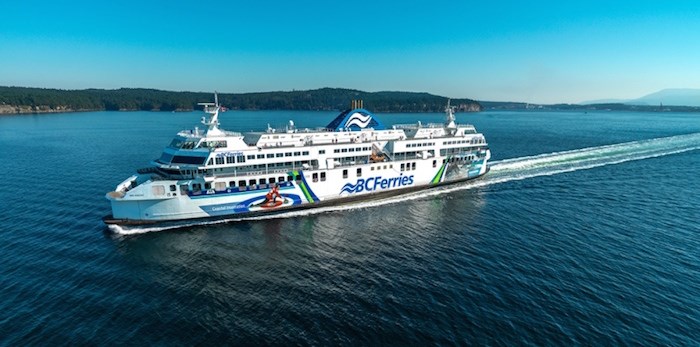Citing the high price of fuel, BC Ferries will implement a fuel surcharge of 1.5 per cent as of June 1.
That means starting next month, a car and driver on BC Ferries’ busiest route — between Swartz Bay and Tsawwassen — will pay $75.80 per trip, an increase of $1.10, while walk-on passengers will pay $17.45, an increase of 25 cents.
 Coastal Inspiration is a BC Ferries vessel currently in service. Photo via BC Ferries
Coastal Inspiration is a BC Ferries vessel currently in service. Photo via BC Ferries
The increase on most of BC Ferries’ inter-island routes will be 15 cents for an adult and 45 cents for a vehicle.
According to BC Ferries, the company closely monitors the cost of fuel and applies a rebate or surcharge, or neither, under a regulatory process that is independent of fares.
BC Ferries chief executive Mark Collins said despite the company’s move to cheaper fuel sources, the move was unavoidable.
“We now have five vessels operating on liquefied natural gas, a cleaner and less expensive fuel source than the ultra-low sulphur diesel we use for our other vessels. LNG is approximately 50 per cent less expensive than diesel, and its use results in fuel savings that are passed on to our customers,” he said.
“Despite fuel switching and other initiatives to burn fuel more efficiently, a fuel surcharge is now necessary. Fuel is our second largest expense. We know that the affordability of travel is important to our customers, and we will continue to take measures to reduce our fuel consumption further through the introduction of diesel electric battery hybrid vessels.”
BC Ferries has used a fuel rebate/surcharge mechanism to manage volatility in the price of fuel — when fuel prices are low, it passes savings on through a fuel rebate and when they're high, the surcharge is applied.
The company says it does not benefit financially from surcharges or rebates.
On average, the fuel surcharge will be 1.5 per cent on all routes, with the exception of the Port Hardy-Prince Rupert, Prince Rupert-Haida Gwaii and Port Hardy-Central Coast routes.
Those routes have a separate mechanism to take into account the cost of fuel.


